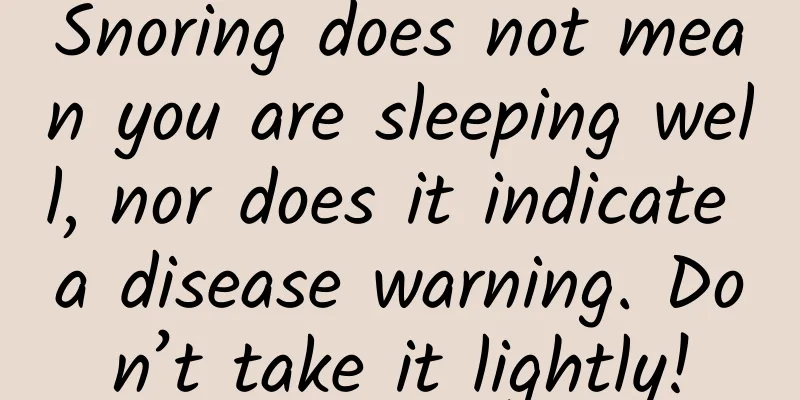Snoring does not mean you are sleeping well, nor does it indicate a disease warning. Don’t take it lightly!

|
Compiled by: Gong Zixin Keeps you awake at night Maybe it’s the person next to you who is snoring loudly? Pay attention! This is not just a nuisance to you It may also be an early warning sign of dangerously high blood pressure Recently, a new study by sleep experts from Flinders University in Australia found that people who snore frequently at night, especially overweight middle-aged men, are more likely to have high blood pressure and uncontrolled hypertension. The study, published in the journal NPJ Digital Medicine, is the largest to date and the first to explore the relationship between snoring and high blood pressure using multiple nighttime home monitoring technologies over a long period of time. "For the first time, we can objectively say there is a significant link between frequent nighttime snoring and high blood pressure," said lead author Dr Bastien Lechat from the Flinders Health and Medical Research Institute and the School of Medicine and Public Health. Dr. Lechat noted that 15% of the participants in the study (mostly overweight men) snored more than 20% of the time each night on average, and that such regular nighttime snoring has been associated with increased blood pressure and uncontrolled hypertension. Snoring is a common phenomenon that affects a large proportion of the population, but its negative health effects are often underestimated. Snoring and sleep apnea often overlap, suggesting that they share common causes. "We observed that people who snore frequently had almost double the risk of developing high blood pressure," said Professor Danny Eckert, Director of Sleep Health at Flinders University and senior author of the paper. Snoring itself may also be an early warning sign of high blood pressure, because poor sleep quality caused by snoring may increase the risk of high blood pressure. High blood pressure can lead to serious health problems such as heart failure, stroke, heart disease or kidney disease. Association between snoring duration and hypertension The study used sleep tracker data collected by sensors under the mattress to detect snoring and sleep apnea, as well as FDA-registered home blood pressure monitors, to survey more than 12,000 participants around the world over a nine-month period. Dr. Lechat noted that this study, by investigating the potential relationship between snoring, sleep apnea, and hypertension through objective assessment at home, revealed important insights into the potential consequences of snoring on the risk of hypertension. It also highlights the need to consider snoring as part of clinical care and management of sleep problems, especially in the context of hypertension management. He added: "This finding paves the way for further research into whether therapeutic interventions targeting snoring can reduce high blood pressure and the risks associated with it." Do women tend to snore lightly? It is often said that women tend to snore less frequently, softer and gentler than men. In fact, there is no difference in snoring intensity between the sexes. A study in the Journal of Clinical Sleep Medicine showed that women tend to underestimate the incidence and loudness of their snoring. The study showed that objectively measured snoring was detected in 88% of women (591 of 675), but only 72% of women reported that they snored. In contrast, men's objective snoring (92.6%) and self-reported snoring (93.1%) were almost the same. The study also found that women snore just as loudly as men, with the average maximum snoring intensity of 50 decibels for women and 51.7 decibels for men. About 49% of women had severe or very severe snoring, but only 40% of women thought they snored to this severity. If you or a family member's snoring is accompanied by lack of sleep, excessive sleepiness, or if breathing problems are observed during sleep, it is recommended that you seek guidance and help from a professional doctor as soon as possible. The cover image and images within this article are from the copyright gallery (or copyright holder). Any reproduction or use may lead to copyright disputes. |
<<: Don’t wear these colors of swimsuits when swimming in summer, it’s really dangerous!
>>: How poisonous is this "poisonous bowl" that netizens are hotly discussing?
Recommend
How long is the shelf life of Dendrobium candidum?
There are many very precious Chinese herbal medic...
Fruit freedom is difficult now, and it was even more difficult before
This article is excerpted from "The Code of ...
What are the taboos of eating American ginseng?
American ginseng is a precious ginseng in my coun...
The efficacy and function of ox marrow
The traditional Chinese medicine ox marrow is oft...
Is a caterpillar a caterpillar whose fur looks like a kitten, or a caterpillar whose fur looks like a cat?
"Survival of the fittest", this sentenc...
Decades ago, doctors performed surgery on babies without anesthesia? They thought babies couldn't feel pain
We all know that babies cry to express physical f...
Why is the anti-cancer drug so expensive at 1.2 million per injection?
This article was first published by Hunzhi (WeCha...
Falkirk Ship: A "special elevator" designed for ships
With the advent of elevators, our lives have beco...
The efficacy and function of green chicken bones
Modern medical research believes that green knot ...
Weekly Technology Awards|Driving into the Deep Blue to Explore the Unknown
In recent years, with the development of aerospac...
The efficacy and function of toad liver
Speaking of toad liver, I believe many friends kn...
The internet-famous wolf in Kekexili was hit and killed by a car? This may be due to feeding
This Monday, many netizens posted on social media...
Eat like this to prevent cancer and chronic diseases! Collect this authoritative anti-inflammatory diet list →
Not long ago, the Chinese Anti-Cancer Association...
Cooking with Creeping Grass
Creeping grass is rarely used in cooking. It is m...
The efficacy and function of cockscomb ginseng
Many people choose Cockscomb ginseng because of i...









